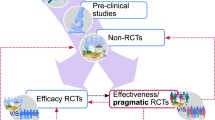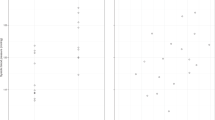Abstract
For randomized controlled trials, the impact of the amount and handling of missing data on the interpretation of the treatment effect has been unclear. The current use of intention to treat, per protocol, and complete-case analysis has shortcomings. The use of estimands may lead to improved estimation of treatment effects through more precise characterizations of the fate of treatments after dropout or other post-randomization events. A perspective on current and future developments with a view toward clinical nutrition is provided.
This is a preview of subscription content, access via your institution
Access options
Subscribe to this journal
Receive 12 print issues and online access
$259.00 per year
only $21.58 per issue
Buy this article
- Purchase on Springer Link
- Instant access to full article PDF
Prices may be subject to local taxes which are calculated during checkout

Similar content being viewed by others
References
International Conference on Harmonisation (ICH). E9(R1): Statistical principles for clinical trials: Addendum Estimands and Sensitivity Analyses in Clinical Trials; 2017.
Mallinckrodt CH. Preventing and treating missing in longitudinal clinical trials. Cambridge: Cambridge University Press; 2013.
Leuchs A-K, Zinserling J, Brandt A, Wirtz D, Benda N. Choosing appropriate estimands in clinicals. Ther Innov Regul Sci. 2015;49:584–92.
Helms RW. Precise definitions of some terminology for longitudinal clinical trials: subjects, patient populations, analysis sets, intention to treat, and related terms. Pharm Stat. 2016;15:471–85.
Carpenter JR, Roger JH, Kenward MG. Analysis of longitudinal trials with protocol deviation: a framework for relevant, accessible assumptions, and inference via multiple imputation. J Biopharm Stat. 2013;23:1352–71.
Permutt T. A taxonomy of estimands for regulatory clinical trials with discontinuations. Stat Med. 2016;35:2865–75.
Mallinckrodt CH, Molenberghs G, Rathmann S. Choosing estimands in clinical trials with missing data. Pharm Stat. 2017;16:29–36.
Geiker NRW, Ritz C, Pedersen SD, Larsen TM, Hill JO, Astrup A. A weight-loss program adapted to the menstrual cycle increases weight loss in healthy, overweight, premenopausal women: a 6-mo randomized controlled trial. Am J Clin Nutr. 2016;104:15–20.
White IR, Carpenter J, Horton NJ. Including all individuals is not enough: lessons for intention-to-treat analysis. Clin Trials. 2012;9:396–407.
Olsen MF, Abdissa A, Kæstel P, Tesfaye M, Yilma D, Girma T, et al. Nutrient supplements improve weight gain, lean mass, grip strength and immune recovery in HIV-patients initiating antiretroviral treatment: a randomised controlled trial in Ethiopia. BMJ. 2014;348:g3187.
Perkin MR, Logan K, Tseng A, Raji B, Ayis S, Peacock J, et al. Randomized trial of introduction of allergenic foods in breast-fed infants. New Engl J Med. 2016;374:1733–43.
Leuchs A-K, Brandt A, Zinserling J, Benda N. Disentangling estimands and the intention-to-treat principle. Pharm Stat. 2017;16:12–19.
Johnston BC, Guyatt GH. Best (but oft-forgotten) practices: intention-to-treat, treatment adherence, and missing participant outcome data in the nutrition literature. Am J Clin Nutr. 2016;104:1197–201.
Lu K. An analytic method for the placebo-based pattern-mixture model. Stat Med. 2014;33:1134–45.
Holzhauer B, Akacha M, Bermann G. Choice of estimand and analysis methods in diabetes trials with rescue medication. Pharm Stat. 2015;14:433–47.
Little R, Kang S. Intention-to-treat analysis with treatment discontinuation and missing data in clinical trials. Stat Med. 2015;34:2381–90.
Akacha M, Bretz F, Ruberg S. Estimands in clinical trials – broadening the perspective. Stat Med. 2017;36:5–19.
Author information
Authors and Affiliations
Corresponding author
Ethics declarations
Conflict of interest
The authors declare that they have no conflict of interest.
Rights and permissions
About this article
Cite this article
Ritz, C., Rønn, B. Estimands: improving inference in randomized controlled trials in clinical nutrition in the presence of missing values. Eur J Clin Nutr 72, 1291–1295 (2018). https://doi.org/10.1038/s41430-018-0207-x
Received:
Accepted:
Published:
Issue Date:
DOI: https://doi.org/10.1038/s41430-018-0207-x
This article is cited by
-
Statistical analysis of continuous outcomes from parallel-arm randomized controlled trials in nutrition—a tutorial
European Journal of Clinical Nutrition (2021)



